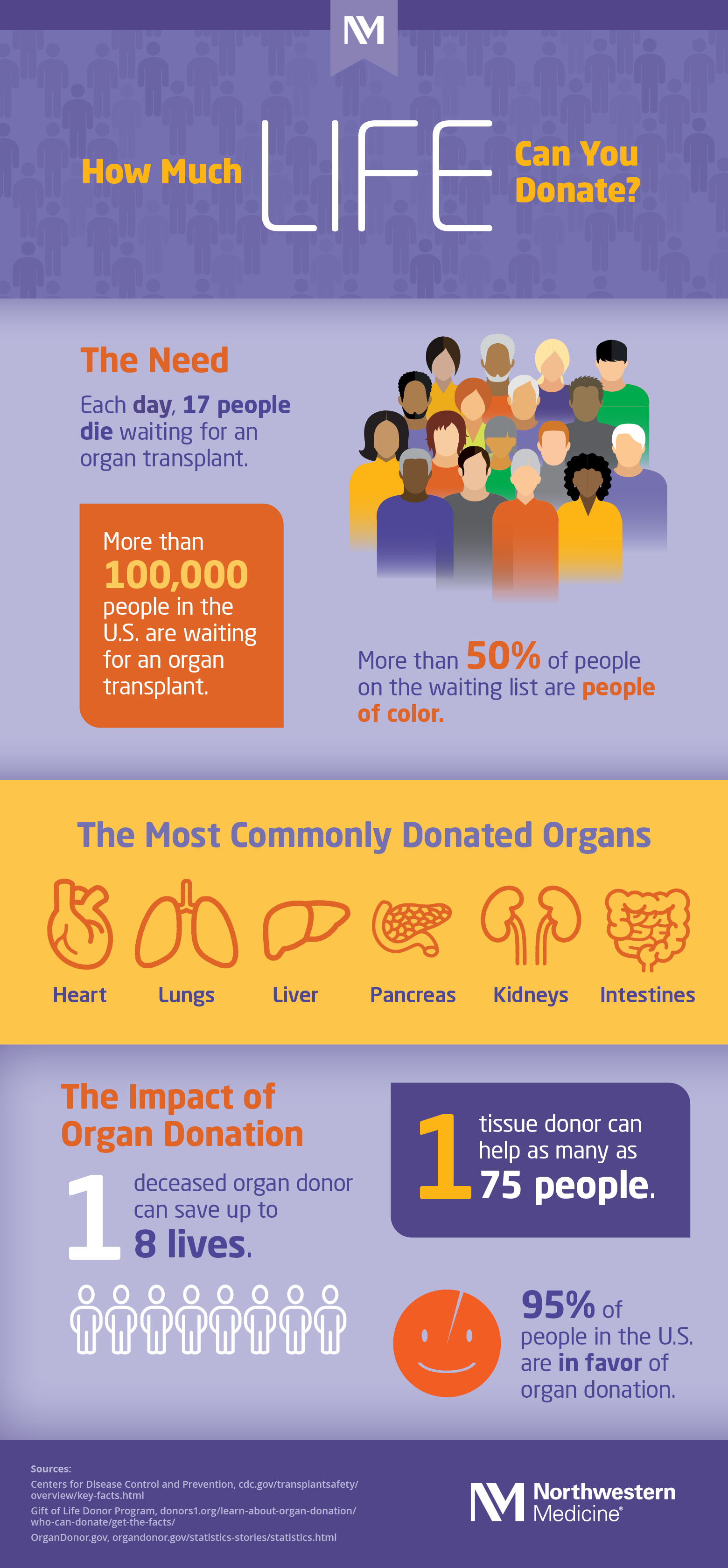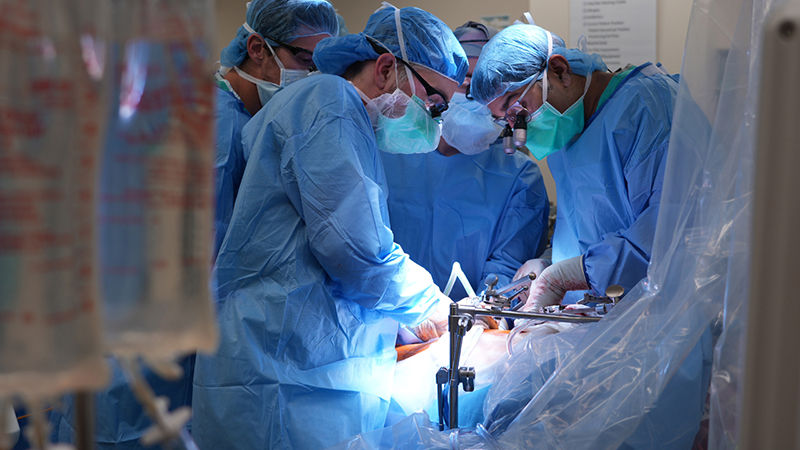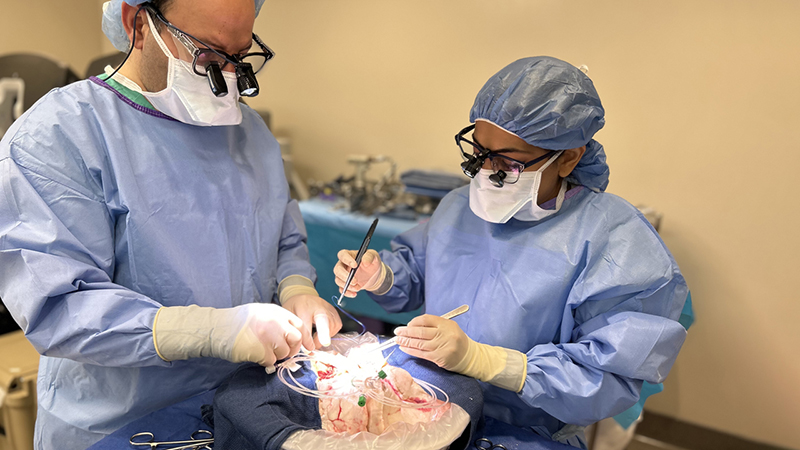How Much Life Can You Donate?
Top Questions About Organ Donation Answered
Updated January 2024
Each day, 17 people die waiting for an organ transplant. And, more than 100,000 people in the U.S. are currently waiting for an organ transplant that could save their lives.
While 60% of people in the U.S. are signed up to be deceased organ donors, the demand for organs far exceeds the supply.
"In Illinois, patients typically wait five to six years for a kidney transplant from deceased donors, which is less than the average wait time in other states," says Juan C. Caicedo Ramirez, MD, surgical director of the Northwestern Medicine Liver Transplant Program and director of the Northwestern Medicine Hispanic Transplant Program.
How and what can you donate?
You can take up to 70% of a liver, and it will grow back.— Juan C. Caicedo Ramirez, MD
There are two main types of organ transplantations:
- Deceased donor organ transplantation: A surgical procedure to remove and then transplant an organ from a registered donor who died and was willing to donate life-saving organs, such as a heart, lungs, kidneys, pancreas, livers and intestines. These donors can also donate tissues, including corneas, skin, bones, heart valves and ligaments.
- Living donor organ transplantation: A surgical procedure to remove an organ from a living person to place in another living person who has a nonfunctioning organ. Living donors can donate one kidney and part of their liver. "You can take up to 70% of someone's liver and it will grow back," says Dr. Caicedo Ramirez.
Today, the number of deceased donor transplantations is greater than the number of living donor transplantations.
Who can be a donor?
Anyone can register to be an organ donor, but not everyone who wants to be a donor can be a donor. Potential living donors must be in relatively good health, both physically and emotionally. In addition, kidney donors need to be older than 18, and liver donors must be aged 18 to 60.
As a potential living donor, you'll go through a confidential evaluation process to determine the health of your organs, emotional readiness and education around organ donation. "We want to ensure that donors are ready," explains Dr. Caicedo Ramirez. "They have to convince us that they should donate. The safety of the donor is the most important consideration in this process."
How is a match determined?
Donor transplantation can occur in two ways:
- Directed donation: A donor allocates an organ to a patient, such as a friend or family member. In this case, they are registered as a donor with the intention of supporting the health of one specific recipient by donating a specific organ. This is the most common type of living donor transplantation.
- Nondirected donation: A donor donates an organ without the intent of giving the organ to a specific patient. This typically occurs when someone registers as an organ donor, often displayed on their driver's license, but can also happen if the individual chooses to donate an organ to a health system or organization that will then select the best match for a recipient at the top of the organ transplant waiting list. This choice is also available to living kidney and liver donors.
Then, transplant care teams evaluate the donor’s medical needs, blood type, and anatomy and size of the organ are evaluated to check if the donor is compatible with a recipient.
Are there options if my living donor is incompatible?
Approximately one‐third of living donors who come forward are not matches for their intended recipient because their blood type and immune system are incompatible. In the past, a blood type or immune system difference would have ruled out a donor and recipient pair. Now, there are two options:
Desensitization treatment: Before and after a transplant, patients can undergo treatments that help make their antibodies compatible to the donor kidney. Typically, three to five treatments are required before transplant. Long‐term outcomes of kidney transplants following desensitization have been excellent and comparable to compatible donor transplants.
Kidney paired donation: Another option for donor and recipient pairs who aren’t compatible is kidney paired donation (KPD). KPD transplants are made possible when a kidney donor who is incompatible with the intended recipient is paired with another donor and recipient in the same situation.
What types of conditions require organ donation?
There are many causes of organ failure that may require an organ transplantation. These include:
- Diabetes
- High blood pressure
- Hepatitis B and C
- Kidney or liver failure
- Cardiomyopathy, or disease of the heart muscle
- Short bowel syndrome, or disease of the small intestine
- Polycystic kidneys
- Cirrhosis, or the scarring of the liver
- Chronic obstructive pulmonary disease (COPD), or the loss of lung function
- Coronary heart disease
- Cystic fibrosis (CF)
Is organ donation risky?
There are many myths surrounding the safety of organ living donation. However, the health of each individual patient comes first. "The guiding principle is that minimizing the risk and protecting the safety of the donor is the most important piece of the process," explains Dr. Caicedo Ramirez.
For living donors, the donation procedure uses a minimally invasive approach that typically results in less pain, a shorter hospital stay and a faster recovery. For deceased donors, the patient is only considered once all avenues are exhausted to save the potential donor's life.
All organ donation is completely voluntary. Donors have the power to change lives and provide hope to those in need. "God knows we need organs more here on earth than we do in heaven," states Dr. Caicedo Ramirez.
You can register to become an organ donor today.







